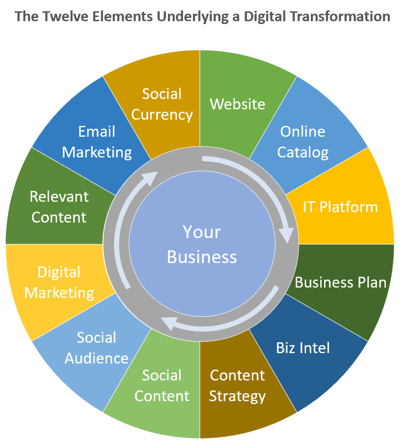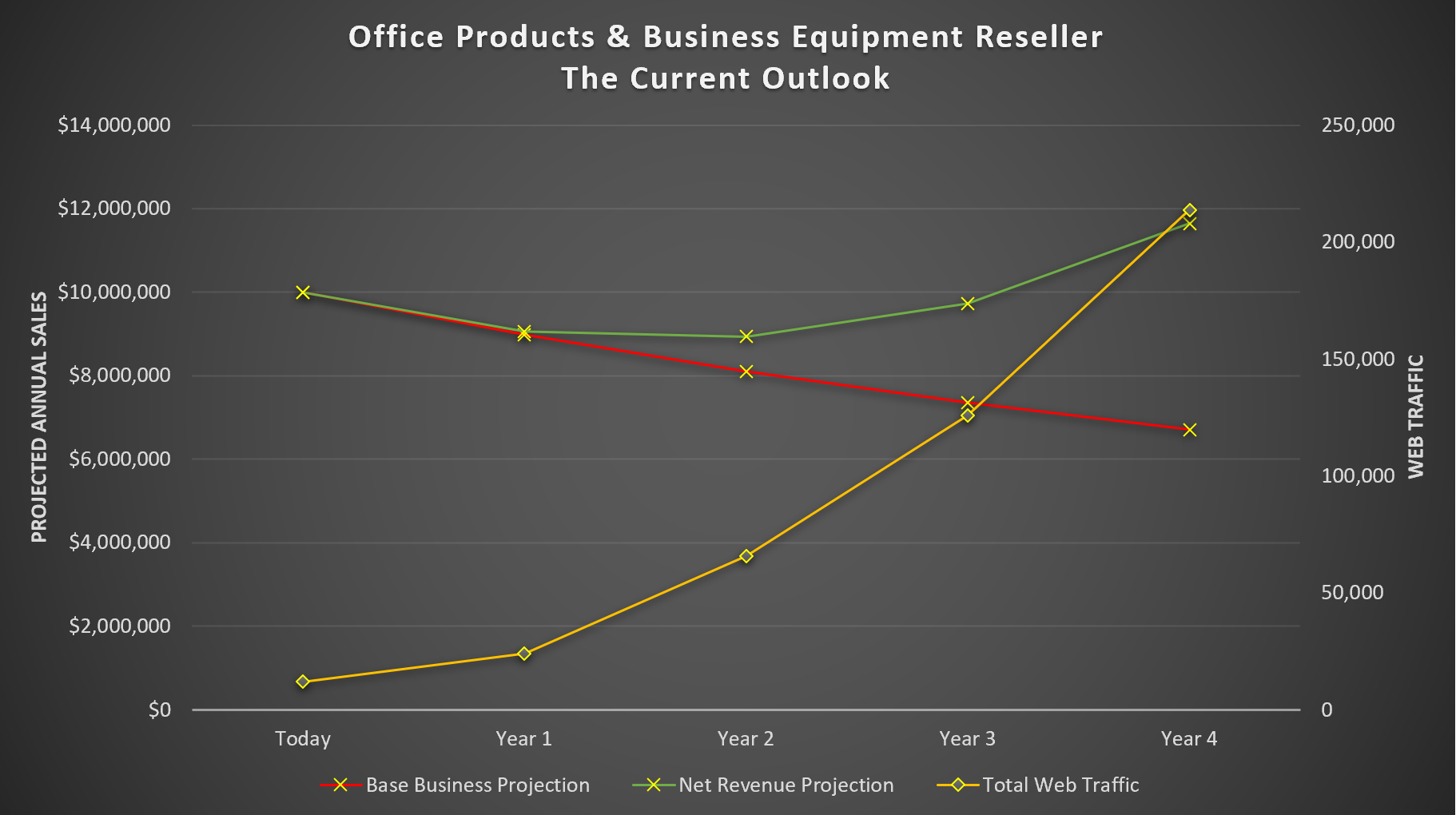 We've argued there's a $20 billion growth opportunity associated with replacement ink and toner cartridges, a $25 billion category that underpins the entire $150 billion plus office industry. However, it's an opportunity that remains difficult to exploit while certain, complex, technology barriers remain in place that currently prevent alternatives from being seamlessly added to a resellers value proposition.
We've argued there's a $20 billion growth opportunity associated with replacement ink and toner cartridges, a $25 billion category that underpins the entire $150 billion plus office industry. However, it's an opportunity that remains difficult to exploit while certain, complex, technology barriers remain in place that currently prevent alternatives from being seamlessly added to a resellers value proposition.
Previously in this series, where we've been focusing on an independent resellers digital transformation initiatives, we've already explained the importance for the need to close the technology gap, the potential role aftermarket replacement cartridges can play in improving the value proposition, the barriers that have historically prevented them from doing so, the structure and strategy underlying a website that are necessary to help build trust with researching buyers, the content strategy that must underlie efforts to develop relevant traffic to that website, and the science underlying the development of web traffic.
1. We've already illustrated there is an experienced and knowledgeable reseller organization in place with the skills to take advantage of the growth opportunity if the barriers can be removed.
2. Most managers are aware significant changes are taking place to the way business is being conducted and, at the heart of these changes is the digital environment the internet has created. It should be clear, a new set of business skills incorporating a digital strategy are necessary to operate successfully within this environment.
3. However, many of the independent resellers lack the digital skills necessary to establish the platform needed to develop the opportunity. Many are also experiencing declining sales and profitability, further reducing options to pay others for the skills they lack.
4. Furthermore, in lacking these skills, it makes it difficult to assess whether others, that claim to have the skills needed, are really qualified to help.
These circumstances have combined to prevent most resellers from understanding enough about each of the platform components needed to launch a digital transformation, let alone implementing strategies and tactics to actually start one.
In summary, building a digital transformation platform, and implementing a business transformation strategy, has proven too challenging for most independent resellers. Furthermore, even with the platform, it's not easy and it's not going to happen overnight. It's hard work, it takes time, and a host of new skills are required. Recognition of these challenges is also necessary before taking the first steps toward a transformation.
Throughout this paper, we've made the case for the following requirements:
-
A "rule-conforming" website incorporating sophisticated visit-to-lead conversion strategies.
-
World-class content with a strategic purpose, designed for educating, developing trust, and building confidence.
-
An expanding and engaged social audience.
-
High-quality backlinks for the purpose of increasing domain authority.
-
Creating and deploying an inbound digital marketing strategy for web traffic development and successful e-commerce.
As we illustrated in the previous article, the resellers in the office industry who have successfully accomplished a digital transformation consist of a small group of big companies. They've spent millions of dollars and 20+ years getting to the position they now benefit from. Small to medium size independent resellers do not have the resources, or know-how, to independently replicate the technology and the tactics they have used, thereby eliminating options for them to implement "go-it-alone" initiatives. The scale and the complexity of the elements involved are, not surprisingly, beyond them.
In order to better illustrate this scale and complexity, let's temporarily put ourselves in the shoes of a small to medium size reseller, and identify everything it must account for as it contemplates the requirements for an "analog to digital" business transformation.

-
A new website specifically developed for the industry, content marketing, and sophisticated visit-to-lead conversion strategies.
-
Vendor agnostic online product catalog specifically configured for B2B commerce channels.
-
Modular information technology platform, including integrated website, e-commerce, CRM, email marketing, accounting, and digital marketing.
-
Business Plan to establish goals and key performance indicators necessary for measuring performance against plan.
-
Business Intelligence enhancements - a successful digital strategy requires data to be converted into business intelligence.
-
Content strategy - an understanding of a content strategy must be developed. Attempting a digital strategy and development of relevant content without a plan will fail.
-
Social Media platform setup - a minimum of four platforms will be necessary - LinkedIn, Facebook, Google+ and Twitter. Each of these platforms must be optimized for them to have any value.
-
Social Audience Building - how to build and engage with a relevant audience is imperative. Optimizing each of the platforms but not understanding how to build and engage with an audience is not going to help.
-
Digital Marketing - a solid understanding of digital marketing techniques and strategy must be developed. The scope of the field is vast and researching and developing a viable strategy will consume a lot of time.
-
Relevant content - a business either has to generate its own content or outsource. No one knows the business better than the owner and outsourcing to a less knowledgeable agency involves a significant risk that the content will not be useful or respected by the target audience.
-
Email Marketing - one of the most important components of a digital strategy as this will be the primary platform for communicating with prospects and nurturing leads. Significant time will need to be invested to understand modern techniques for the development of effective campaigns.
-
Social currency - we've seen how valuable incorporating a social media strategy can be for the larger enterprises. For independent resellers, publishing and promoting social media content must become an important component of their digital strategy. Significant time will be required to develop a sufficient understanding of what to do, and then to maintain these efforts on an ongoing basis.
Attempting to independently satisfy these requirements will require an upfront investment in the region of $45,000 and recurring monthly expenses of nearly $8,000.
That's a $140,000 expense in the first year alone, followed by recurring annual expenses of $100,000. This is a cost-prohibitive investment for a small to medium size business and, even for a reseller with the revenue scale and the skills to understand the concepts and risks, it's unlikely to be considered a realistic option.
Furthermore, we have to look at the scale of this investment in the context of the current market conditions where a number of factors are combining to hit the top line of typical resellers:
- Market shrink.
- Competition (i.e. Amazon) and customer churn.
- Price compression.
- Adverse product mix changes.
These conditions are reducing the top line of a typical reseller by as much as 10% per year and, unfortunately, it takes a lot to turn around a decline of this scale. Even an expertly implemented digital marketing strategy will not accomplish this immediately and, although it can be anticipated to slow the decline and eventually lead to growth, resellers still have to face up to a couple of years of continued revenue decline.

The above chart illustrates the problem. The red line shows the trend-line for a $10M reseller (it won't be substantially different for a $2M or $20M reseller or any other size for that matter), and the green line shows the business outlook for that same $10M reseller implementing a full-scale digital transformation using all of the twelve elements we've previously identified.
How many owners are likely to have the fortitude to continue with the investment as the top line continues to decrease in year one, does no more than to stabilize in year two, increases slightly in year three, but doesn't even pass beyond the threshold of the starting point until year four? The answer is, not many. Until a reseller has faced up to the baseline outlook and accepted the foresight to measure actual performance during the transformation against that baseline, then they will conclude the transformation isn't working and will probably abandon it.
Furthermore, if revenues are declining at 10% per year, profits are almost certainly declining at a faster rate. Clearly, paying for a digital transformation has to come out of profits, which, as they decrease, further reduces the likelihood of a reseller being in a position to invest in the first place.
Finally, the deterrent is not just the cost. The other, and perhaps even more formidable deterrent, is the know-how. How many resellers really understand all twelve transformational elements presented in our wheel above? How many understand them well enough to seriously contemplate investing over $400,000 during a four-year transition period to try and implement them? The answers again, as we know, are very few.
And so we have the catch-22. The cost is too high, and the typical decision maker rarely has sufficient understanding of all the elements involved to trust his, or her, decision-making capability to invest funds of the scale necessary to accomplish the transformation. However, and here's the catch-22, without implementing such a strategy the 10% per year decline in revenues will continue unabated until the reseller fails or is forced to sell at a discount.
In the concluding article of this series, we will move on to explain how the technology solution must enable each of the different pieces of the platform to work together to help optimize sell prices and lower costs, features that serve to improve margins in a tangible and measurable way. Improved margins that, not only help finance the overall transformation strategy but also act as key performance indicators typical owners are more readily capable of understanding.
To learn more about the reseller's value proposition, the technology platform, and the importance of developing web traffic, sign-up for our blog to receive automatic notifications as we publish new, directly related content.
Alternatively, please click the following link for immediate access to the complete eight-part series, "Crafting and Promoting the Resellers Business Strategy" or, to learn more about the full scope of this material, and to access in a downloadable e-Book format, please click the cover image below.











